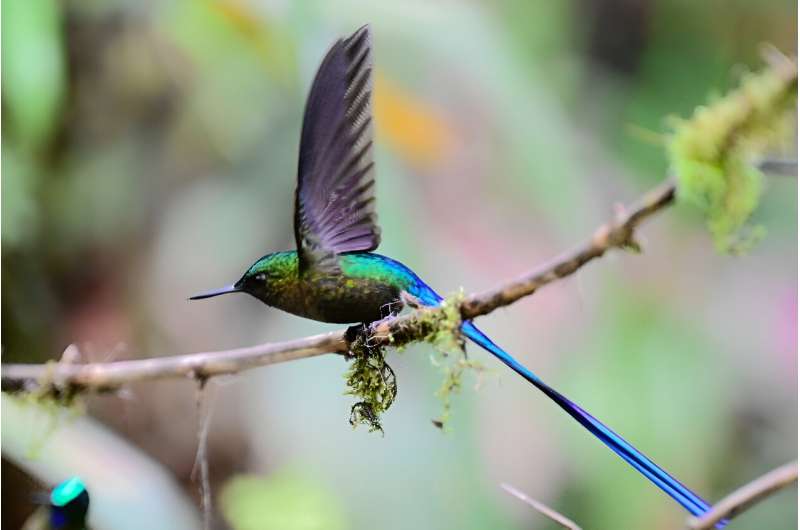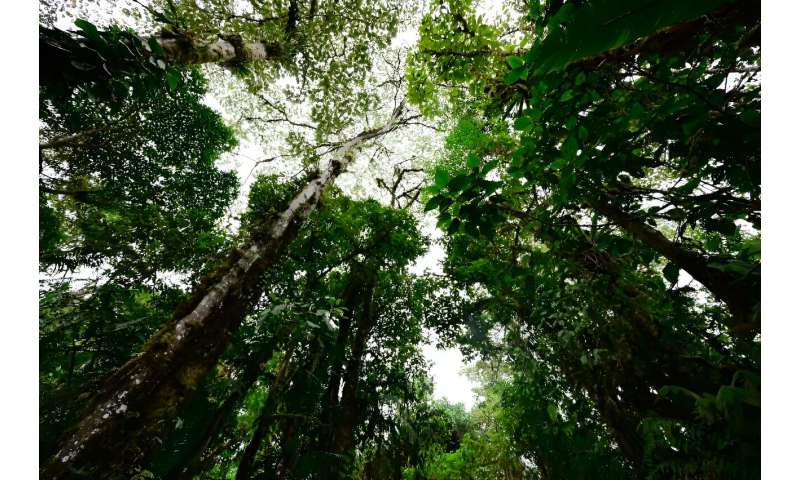This article has been reviewed according to Science X's editorial process and policies. Editors have highlighted the following attributes while ensuring the content's credibility:
fact-checked
reputable news agency
proofread
Activists seek clarity over mining ban in Ecuador forest reserve

A sprawling Ecuadoran forest reserve, home to toucans and the spectacled bear, is at the heart of a tug-of-war between environmentalist and miners.
A year ago, residents and environmentalists scored a hard-won victory in a local referendum that banned any new metal extraction in the Choco Andino Biosphere Reserve, a UN-designated biodiversity hotspot.
But they complain the government has not shared details on how the ban is being implemented, or whether new concessions have been granted since the referendum, voted for by residents of the capital Quito, and surrounds.
They also want clarity on what will happen with mining permits that were still in process when the referendum was approved.
"Concessions must be reviewed. Mining continues" despite the ban, biologist Inty Arcos, 45, and member of the Quito without Mining collective, which fought for the referendum, told AFP.
"Miners continue to enter, illegal mining continues, (gold) material continues to leave and this with all the anxiety (...) because there is also violence around mining, there are organized criminal groups," he said.
The Ministry of Energy and Mines did not respond immediately to AFP's requests for comment.

The cloud-kissed forest is a birdwatcher's paradise home to some 600 bird species, like cotingas, with their vibrant patterns and unique features.
The reserve is also home to 270 mammal species.
"This is a paradise of great biodiversity. There are toucans, cotingas... There are also mammals like squirrels and spectacled bears," said Rolando Garcia, 60, a resident of Mindo, northwest of Quito.
"Mining is not good, it destroys everything," said the self-taught ornithologist, who makes a living giving bird-watching tours to tourists.
Some 21,000 people live inside the forested area covered by the ban on new mining projects.
'Not clear enough'
Maria Eulalia Silva, executive president of the Chamber of Mining, said that stopping mining entirely made no sense in an area with poverty levels at 80 percent.

"You cannot talk about wanting to protect the environment by leaving communities without opportunities for development. Poverty is also one of the greatest threats to the environment," she said.
She told AFP that companies that already had "mining rights do not have to withdraw from the area".
"Those who had a mining permit granted by the Ecuadoran State before the referendum can complete all phases of mining," she said.
"The impact of the referendum is that there will not be new concessions" in the area where "there is small-scale mining and industrial mining in very early stages of exploration."
Those opposed to the mining say they intend to appeal to the Constitutional Court to clarify the details of the ban, especially for projects that were still in the exploratory phase prior to the referendum.
-

Tourists watch birds in a private reserve in Mindo, Ecuador on August 16, 2024. -

View of the forest in a private reserve in Mindo, Ecuador, taken on August 16, 2024.
"Many claim that (the ruling) is not clear enough," says Teolinda Calle, of the Quito Without Mines collective.
With just two industrial gold and copper deposits—situated in the Amazon—Ecuador's mining exports reached a record $3.324 billion in 2023 and could climb to $10 billion (10 percent of GDP) in 2030, according to the Chamber of Mining.
Rich in gold, copper, and silver, mining has become a strategic sector for the traditionally oil-dependent country, also known for its shrimp and banana exports.
But environmentalists and residents of the Choco Andino fear for its fragile ecosystems.
"You can see the hummingbirds, for example. Imagine the impact on these species, these tiny animals, from an explosion to break the rock, or the opening of a road to allow large trucks and tractors to enter," said Arcos.
© 2024 AFP




















